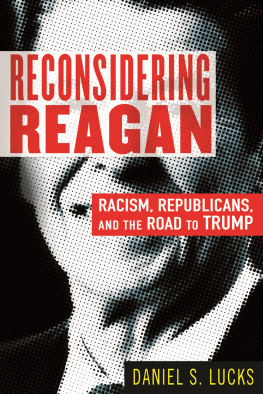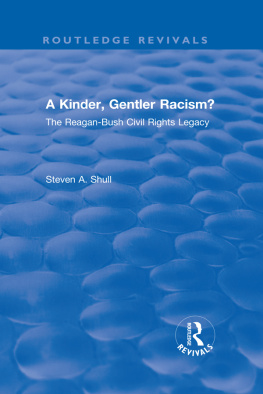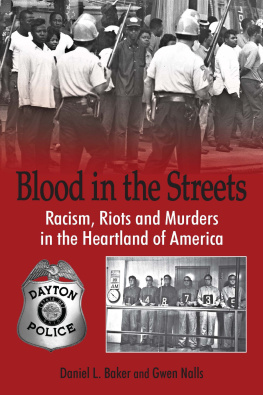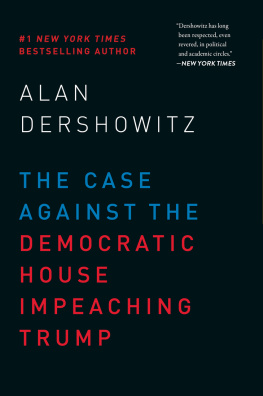Daniel S. Lucks - Reconsidering Reagan: Racism, Republicans, and the Road to Trump
Here you can read online Daniel S. Lucks - Reconsidering Reagan: Racism, Republicans, and the Road to Trump full text of the book (entire story) in english for free. Download pdf and epub, get meaning, cover and reviews about this ebook. genre: Politics. Description of the work, (preface) as well as reviews are available. Best literature library LitArk.com created for fans of good reading and offers a wide selection of genres:
Romance novel
Science fiction
Adventure
Detective
Science
History
Home and family
Prose
Art
Politics
Computer
Non-fiction
Religion
Business
Children
Humor
Choose a favorite category and find really read worthwhile books. Enjoy immersion in the world of imagination, feel the emotions of the characters or learn something new for yourself, make an fascinating discovery.
- Book:Reconsidering Reagan: Racism, Republicans, and the Road to Trump
- Author:
- Genre:
- Rating:5 / 5
- Favourites:Add to favourites
- Your mark:
- 100
- 1
- 2
- 3
- 4
- 5
Reconsidering Reagan: Racism, Republicans, and the Road to Trump: summary, description and annotation
We offer to read an annotation, description, summary or preface (depends on what the author of the book "Reconsidering Reagan: Racism, Republicans, and the Road to Trump" wrote himself). If you haven't found the necessary information about the book — write in the comments, we will try to find it.
Reconsidering Reagan: Racism, Republicans, and the Road to Trump — read online for free the complete book (whole text) full work
Below is the text of the book, divided by pages. System saving the place of the last page read, allows you to conveniently read the book "Reconsidering Reagan: Racism, Republicans, and the Road to Trump" online for free, without having to search again every time where you left off. Put a bookmark, and you can go to the page where you finished reading at any time.
Font size:
Interval:
Bookmark:


To Drs. Deborah and Lee Meisel
Ronald Reagan ran on practically the same platform I ran on in 1948.... Im very pleasantly surprised. I didnt think it would happen in my lifetime.
Strom Thurmond boasting to a reporter (1981)
Nothing has frustrated me more in this job than the false image of bigotry that has been fastened upon me.
Ronald Reagan to a constituent (1984)
R onald Reagans sunny demeanor, charisma, and old-fashioned patriotism captured the imagination of the American electorate, catapulting him to two consecutive presidential landslide victories in 1980 and 1984.
In an effort to score political points to help perpetuate a robust future for conservatism, conservatives launched the Ronald Reagan Legacy Project during the Clinton presidency, which sanitized Reagan and succeeded in distorting his legacy beyond recognition. Namely, the projects success in mythologizing Reagan has obscured his longstanding hostility to the civil rights movement, skill in exploiting white racism for political gain without appearing racist, and his efforts to turn the clock back on civil rights during his presidency. It has also whitewashed most Blacks unremitting disdain for Reagan and his racist politics and policies that festered throughout the entirety of Reagans political career. Reconsidering Reagan documents how Reagans woeful legacy on race contradicts conservatives view of Reagan as a national saint and constitutes a blight on his legacy.
President Donald Trumps barrage of blatantly racist statements has propelled race to the forefront of American political life, thereby providing a timely opportunity to reappraise Reagans record on race and civil rights. While Trump was more overt in his racism, Reconsidering Reagan demonstrates that Reagans record on civil rights was just as racist as Trumps. Most tellingly, Nobel Peace Prize recipients Martin Luther King Jr. and Archbishop Desmond Tutu both branded Reagan as a racist for his support of the white supremacist South in the 1960s and the white supremacist South African regime. Days after Reagans 1966 landslide victory in the gubernatorial election in California, a distraught King decried Reagans scarcely disguised appeals to bigotry. By any conceivable standard, close political alliances with white supremacists exceeded Kings remote links with Communists, a claim that Reagan repeated in October 1983 after reluctantly signing the bill making Kings birthday a national holiday.
Given Reagans stature as a transformative political figure, books on virtually all aspects of Reagans life and presidency abound. It also demonstrates the extent to which Reagan was on the wrong side of history in a civil rights movement that forced the nation to reckon with its original sin of slavery and explains why African Americans overwhelmingly viewed him with contempt.
Indeed, Blacks distrust of Reagan began from the moment he entered the political arena as a Barry Goldwater states rights conservative opposing the landmark Civil Rights Act of 1964. This coincided with Goldwaters conservative movements success in making inroads with the Democratic South by opposing federal intervention to topple Jim Crow, the racial caste system that operated primarily in the South. In his 1966 campaign for governor, which occurred not long after the August 1965 Watts riots, Reagan made the explosive issue of race a centerpiece of his campaign while distancing himself from segregationists. Against the backdrop of the carnage of the Watts riots, he deployed the racially freighted term law and order, blamed the riots on liberal politicians coddling lawless criminals, and the liberal notion that government policies are the answer to poverty. At virtually every campaign stop, he stoked white middle-class fears of residential integration by excoriating Californias controversial and far-reaching Fair Housing Act. Reagans victory over Brown was the first major triumph of the white backlash against the civil rights movement, as millions of middle-class white Democrats voted Republican for the first time, largely over concerns of riots, residential integration, and the influx of Black people to California. Over the years, the enmity of Blacks deepened as Reagan and Nixon became the avatars of the Republican Partys Southern strategy.
Reconsidering Reagan is a corrective to Reagans inflated reputation and legacy that belied his racially reactionary policies and his offensive rhetoric. The Ronald Reagan Legacy Projects success in canonizing Reagan as a great president and a role model for future presidents reaped immense dividends. Within a few years after its creation in 1997, Reagans conservative acolytes had succeeded in divorcing Reagans legacy from reality. They lauded Reagan as a heroic president who restored America to greatness after the ravages of the 1960s, and endlessly touted the myth that he single-handedly won the Cold War without firing a shot. As the efforts to chisel Reagans face on Mt. Rushmore, replace the profile of Franklin Roosevelt on the dime with that of Reagan, and erect a Reagan memorial near the National Mall in Washington, DC, gained momentum by the late 1990s, criticism of Reagan had virtually receded from mainstream public discourse. Such mythmaking obscures the fact that during his presidency Reagan was a polarizing political presence, and his approval ratings were often lower than his immediate predecessors. In particular, the deification of Reagan into a national saint has prevented the country from having a frank discussion on Reagans divisive racial legacy and his failure to even recognize, let alone reconcile, what Gunnar Myrdal called the American Dilemmathe disparity between American ideals and its racial practices.
In July 2019, the National Archives released an October 1971 audio clip between then governor Reagan and President Nixon in which Reagan called African diplomats monkeys still uncomfortable wearing shoes, which has brought new interest to Reagans troubling record on race. These revelations of Reagans racism, coming in the middle of the Trump era, have made the investigation of Reagan and race more urgent. In the popular imagination, it is not Reagans civil rights policies but his reassuring persona, militant anti-Communism, and calls to roll-back government that define Reagans legacy. Yet, Reagans subtle skill in stoking white resentments over race was a mainstay of his political success and needs to be taken into account in assessing his overall legacy.
Like many conservatives, Reagan never honestly confronted Americas racist legacy. This grossly insensitive remark revealed Reagans obliviousness to Americas original sin of slavery. Yet, it is not so shocking given that Reagans political success was in large part fueled by his skill in crafting an idyllic narrative of the past that resonated with white Americans reeling from the racial, cultural, and economic dislocations of the 1960s and 1970s. He spoke of America as a shining city on a hill whose beacon light guides freedom-loving people everywhere, and, echoing Lincoln, as the last, best hope on Earth. However, whereas Lincolns political career and legacy was defined by his collision with slavery, in Reagans America, that original sin of slavery was indiscernible. After a generation of wrenching turmoil, Reagan revived an American exceptionalism, which had always overlooked the baneful legacy of slavery, Jim Crow, and structural racism embedded in the fabric of every institution. For African Americans, this American exceptionalism was tragic and humiliating. James Baldwin, the poet of the civil rights movement, best encapsulated Blacks views of American exceptionalism:
Font size:
Interval:
Bookmark:
Similar books «Reconsidering Reagan: Racism, Republicans, and the Road to Trump»
Look at similar books to Reconsidering Reagan: Racism, Republicans, and the Road to Trump. We have selected literature similar in name and meaning in the hope of providing readers with more options to find new, interesting, not yet read works.
Discussion, reviews of the book Reconsidering Reagan: Racism, Republicans, and the Road to Trump and just readers' own opinions. Leave your comments, write what you think about the work, its meaning or the main characters. Specify what exactly you liked and what you didn't like, and why you think so.









